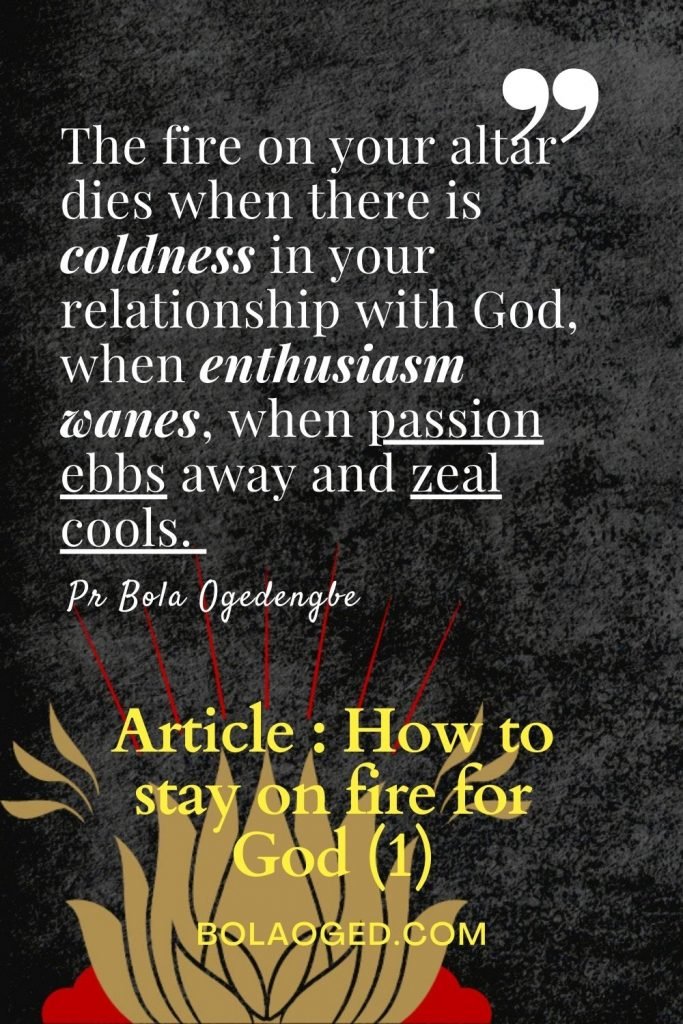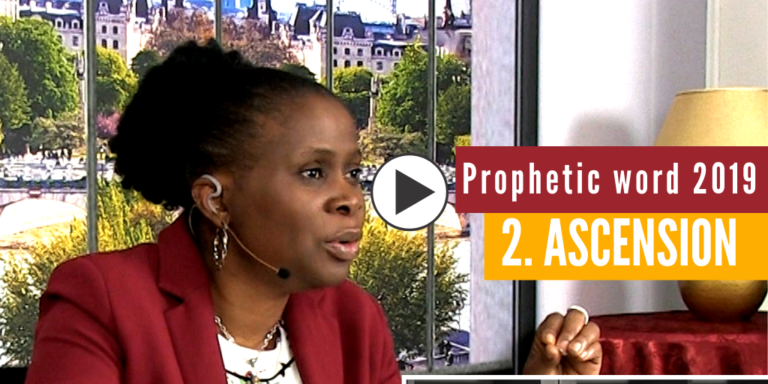Every believer must stay on fire for God. Discover in this powerful video, the importance of fire in your Christian life and how to stay on fire. In this first part of a five-part series, (Keep your fire burning) we go on a journey to see the impact of fire in the Scriptures and how it relates to the vitality of your Christian life today. The priests were to keep the fire burning on the altar continually, so must you.
Read, Watch, share and be blessed. Subscribe to our YouTube channel by clicking on the icon in the top left corner of the video and be informed of our new videos before everyone else.
What is the altar in the life of a believer?
An altar is a place of connection between men and God. In the Old Testament, it was a place where men brought offerings to God to pledge their allegiance and surrender and to dedicate themselves to God. When you erected an altar, you determine that you were serving a deity. Who you erected an altar to determined who you were subservient to and would serve as king. And the deity to whom the altar was erected was the deity who had control over your life and who would guide and direct your life and whose influence would be visible in your life.
Everyone must have a place where he encounters God. While Abraham erected his altar to Yahweh, the surrounding people erected altars to different divinities. And there are places in the world today where they still understand the use of altars as places of worship.
In the New Testament, you may not have a physical altar, but your heart is that altar. And wherever you set apart as a place to encounter the Lord on a daily basis, that would be the place of encounter, the place of meeting with the Lord. This is extremely important in order to remain on fire. And throughout the Old Testament we see many altars set up and the fire on them which symbolizes the presence and the power of God.
What is the fire on the altar?
What do we mean by fire? It is the presence of God, the power of God, the glory of God. It is the experience of the omnipotence of God, intimacy with the Father. Furthermore, it is that place where you live intensely with God. It is a passion for God, love and zeal for Him, passion for his kingdom, for the things of God, burning continually. It’s a heart continually aflame for the Lord.
In Leviticus chapter six, God gives instructions to Moses for Aaron and the other priests as to how they had to conduct the work of the sacrifice. Previously, they had built the tabernacle and the first codified system of worship of Yahweh was to begin.
Lev 6:8-13 The LORD spoke to Moses: “Command Aaron and his sons: This is the law of the burnt offering; the burnt offering itself must remain on the altar’s hearth all night until morning, while the fire of the altar is kept burning on it. The priest is to put on his linen robe and linen undergarments. He is to remove the ashes of the burnt offering the fire has consumed on the altar, and place them beside the altar. Then he must take off his garments, put on other clothes, and bring the ashes outside the camp to a ceremonially clean place. The fire on the altar is to be kept burning; it must not go out. Every morning, the priest will burn wood on the fire. He is to arrange the burnt offering on the fire and burn the fat portions from the fellowship offerings on it. The fire must be kept burning on the altar continually; it must not go out.
Lev 9:23-24 Moses and Aaron then entered the tent of meeting. When they came out, they blessed the people, and the glory of the LORD appeared to all the people. Fire came from the LORD and consumed the burnt offering and the fat portions on the altar. And when all the people saw it, they shouted and fell facedown on the ground.
They saw this fire come from heaven to consume the offering, they recognised that it symbolised the presence of God among them. They saw the glory of God appear, no wonder they shouted and fell facedown before the Lord. This was literal fire, but a child of God also carries that fire within.
Fire symbolises the presence and power of God. It is the approval of God of what is offered to Him and the guarantee of the acceptability of the sacrifice and the maintenance of the relationship.
Fire in the life of the believer is not a matter of mere enthusiasm or just excitement. It is a deep work of God, where we are opened up within to receive more of God inside, and we grow in that love relationship, and our altar is kept a flame of fire.
The fire of divine approval
The fire is the presence, it is also the testimony of divine approval. It comes to demonstrate that God is here, God is involved in this, God approves of what is going on here. Bear in mind that earlier in the chapter we had seen that this fire must be kept going. It is powerful to see that God sends His fire on the earth, and men are to keep it going. They do not kindle the fire, He does, but He does not keep it going, they do.
The fire of the Holy Spirit
This is a powerful demonstration of what our lives should be like. As children of God, fire came upon us from heaven through the Holy Spirit. Indeed when He was sent by Jesus, His presence on the day of Pentecost was seen as tongues of fire coming down on the people gathered in the Upper Room. They were set on fire and begun to preach the gospel with boldness.
And many of us have received the Holy Spirit, every born-again believer has the Holy Spirit, and the Holy Spirit has come to set you on fire.
The continuous fire
Primary among the instructions for the sacrifices, which we know are also symbolical of Jesus, as is the entire tabernacle system, is this one, that the fire on the altar must never go out. The fire must be kept burning on the altar.
The fire that fell on Aaron’s offering had to be kept going and they did, they kept it for hundreds of years. They were to put wood on the fire daily to keep it going.
Keeping the fire going indefinitely was a remarkable feat. A quick search on the internet will show a few fires that have been kept burning for a long time. Sometimes it is a natural phenomenon but in one instance it was a family legacy. One ancestor had lit the fire and the subsequent descendants had kept it going. That takes dedication and hard work.
Well, in the Scriptures, the Lord started the fire. He sent fire down to the earth and said it must not go out. It is incumbent upon every believer to add wood to his fire and never let it die. Jesus has baptised us with the Holy Spirit and with fire as promised in Luke 3.16. This fire must not go out.
Your fire must also be kept burning
How do you maintain the fire of God in your life? This is a very important and crucial issue. Every believer experiences the fire of God at moments in their walk with God, but the problem is that that fire does not always remain. When you have been in pastoral ministry for a long time, you would have seen people touched powerfully by God. Unfortunately, a short time later, they are either back where they were before or at least far below what they experienced when they received the fire. It is easy to get accustomed to this and find it normal, even though it is actually quite peculiar.
We are used to anomalies in the Christian life. Christians receive the fire of God and then all of a sudden they just lose it. They become very dull, church life becomes routine, worship just a ritual, they lack enthusiasm, passion for the things of God, they have no zeal to win the lost and they simply go through the motions, just gathering their blessings wherever they can scrounge for them.
Yet God’s desire is that we receive His fire, build on it, and continue to go higher and higher. The believer should be red hot, fervent, as the Bible says, burning all the time for God. He is to keep the fire burning on his altar. It’s very important for us to understand that in the New Testament, we do not have a literal altar.
Symbolically, however, the brazen altar of the tabernacle symbolised the cross of Christ. Through Christ, we now receive the Holy Spirit of fire. And we can begin from that point on to do the will of the Father. Keeping the fire burning on the altar represents continuity in our worship and service to God, expresses intensity in our devotion to Him.
Whedon puts it this way
“The injunction to keep the fire always burning enforces the duty of undying zeal in the service of Christ through the Holy Spirit ever abiding within as a refiner’s fire. The wood laid on the fire every morning typifies the means of grace daily used, the Holy Scriptures, prayer, and praise “
Whedon
Encounters in fire
Sinai
When God encountered the people on Sinai, He came down in the midst of the fire. Moses brought the people out of the camp to meet God. This is Exodus 19. And they stood at the foot of the mountain. They had to cleanse and purify themselves beforehand. They had to abstain from sexual relations, purify their hearts, repent of their sins.
Exodus 19:17-19 Holman Christian Standard Bible 17 Then Moses brought the people out of the camp to meet God, and they stood at the foot of the mountain. 18 Mount Sinai was completely enveloped in smoke because the Lord came down on it in fire. Its smoke went up like the smoke of a furnace, and the whole mountain shook violently. 19 As the sound of the trumpet grew louder and louder, Moses spoke and God answered him in the thunder.20 The Lord came down on Mount Sinai at the top of the mountain. Then the Lord summoned Moses to the top of the mountain, and he went up.
Moses
And Moses recounts this incident in Deuteronomy, chapter four, He told the people he said,
God spoke to you from the midst of the fire.
He wanted them to understand that this was something significant, that God would speak to them from the midst of the fire. Earlier on Moses himself had had an encounter with God in the burning bush.
Abraham, Daniel, Ezekiel, Elijah…
- Abraham had had a covenant with God, with fire. And throughout the history of God’s people, we see these encounters with fire.
- Daniel had a vision of the throne of God. He saw a throne in flames,
- Ezekiel had a vision of the throne of God, and all he saw was fire.
- Elijah had an encounter with the fire of God that came down from heaven to burn up the offering, and to demonstrate that he was God. There are not all of these creatures that the the all of these idols that he’s people had decided to follow, and to serve.
There are many dimensions to the symbolism of fire. It demonstrates the presence, it demonstrates the power, it demonstrates approval, it demonstrates judgment. We cannot underestimate the importance of fire in the Word of God.
The fire on the tabernacle
Numbers 9:15-16 On the day the tabernacle was set up, the cloud covered the tabernacle, the tent of the testimony, and it appeared like fire above the tabernacle from evening until morning. 16 It remained that way continuously: the cloud would cover it appearing like fire at night.
These people saw the presence of God, in the midst of them, like fire, they saw the fire, they knew God was with them. This is so important because we see how willing God is to help His people to live in His presence, to be conscious of His presence.
Can you imagine God starting the fire, and then He says, ‘keep it burning’. Think of the pressure, think of the responsibility, but these people understood their responsibility, they valued the presence of God.
And so for generations, until the Temple of Solomon was built, the tabernacle fire was kept burning. And when Solomon built his temple, fresh fire came down from heaven to consecrate it.
Fire came down on Solomon’s temple
Now listen, this is what happened.
2Chr 7:1-4 (HCSB) When Solomon finished praying, fire descended from heaven and consumed the burnt offering and the sacrifices, and the glory of the Lord filled the temple. 2 The priests were not able to enter the Lord’s temple because the glory of the Lord filled the temple with the Lord. 3 All the Israelites were watching when the fire descended and the glory of the Lord came on the temple. They bowed down on the pavement with their faces to the ground. They worshipped and praised the Lord:
For He is good,
for His faithful love endures forever.4 The king and all the people were offering sacrifices in the Lord’s presence.
This is what happens when the fire comes, men bow before Him. The fire of God is not
- Momentary excitement
- Temporary enthusiasm
- Oh, I have a testimony, I received a blessing
- The joy that comes from something that happens in my life
Rather, it is a place of spiritual encounter, authority and power. It is an encounter with omnipotence, with a great God, the sole Lord of the universe. The fire on your altar dies when there is coldness in your relationship with Him, when enthusiasm wanes, when passion ebbs away and zeal cools.
Think of the heart of this wonderful God who wants such intimacy and fellowship with his people that even under the Old Covenant, before the Messiah came, and we could have a relationship with him and come freely into the Most Holy Place, He ensured that His presence would be with His people. And that they would have a consciousness of His presence.
The God who wants to be known
Whatever we study in the Scriptures, it must always first and foremost be a study of God. When we see what He does, when we see what He says, what He asks us, we will see who He is.
And so when we look at all these encounters with fire in the Scriptures we encounter a God who wants to be known, we encounter a God who wants to be seen, we realize that there is no reason why a child of God should live bereft of his presence. That can only happen when we draw back.
We see Him persistently revealing Himself despite the constraints of the sinful nature of man. We see Him persistently showing that He is with His people, present, and wanting them to have that real consciousness of his presence.
Fire at Pentecost
And the glorious thing for us under the New Covenant is that He has sent us His Spirit. The Holy Spirit is here. He came in fire and continues to set us on fire when we want Him to. We must crave that fire, as you read this, say it out loud, ‘I want the fire’.
Fire came down at Pentecost and the disciples were forever transformed. They were forever changed.
Fire like a river
When we think of fire, we think of a localised combustion, but we get a glimpse of another dimension of fire in the book of Daniel and it is truly exciting. Daniel sees a river of fire.
Daniel 7:9-10 Holman Christian Standard Bible 9 “As I kept watching, thrones were set in place, and the Ancient of Days took His seat. His clothing was white like snow, and the hair of His head like whitest wool. His throne was flaming fire; its wheels were blazing fire. 10 A river of fire was flowing, coming out from His presence. Thousands upon thousands served Him; ten thousand times ten thousand stood before Him.
Do you see how many times fire comes up in that passage? It says His throne was flaming fire. Its wheels were blazing fire. A river of fire was flowing. That river of fire was coming out from his presence.
A river of fire speaks of a continuing flow of fire in our lives. The symbolism of the river is a very powerful one. The river by its nature never stops flowing. When you see one, you expect continuity, an unending flow, you do not expect it to have disappeared.
If you return one year later and you see a dry river bed, it is a thing of great concern. When that happens, the vegetation will die, there are many attendant negative consequences. A river evokes permanence, continuity, richness, abundance, overflow. In the case of a fire, you do not have the same sense of permanence, you expect it at some point to die out.
However, when we think of a river of fire, we see the same permanence and unending flow of fire. There can be no lack before the throne of God. I have a cry in my heart, that the river of fire coming out from his presence will find its way into my life and continue to flow.
I have a cry in my heart, that the river of fire coming out from his presence will find its way into my life and continue to flow. (How to stay on fire for God (1)) Share on XThis takes us back to the divine injunction that the fire on the altar must be continuous, it must never go out. What they are doing is they’re causing this fire to become a river because they keep it going. So they come every morning, they bring the wood, and they dress the altar so that the fire will keep burning, just as the river would keep flowing.
Every child of God should accept the challenge that there will not only be fire on their altar but a river of fire in their life. You can decide to have and live in a place of encounter with God, a place of passion, a place of zeal, a place where you meet face to face with God. No child of God should be bereft of His presence. We are supposed to be able to encounter Him, know Him, walk with Him, and be set ablaze.
God reveals himself in fire, he touches us with the fire of the Holy Spirit. The Holy Spirit is the fire that has come from heaven. Just as the fire came down on the sacrifices of Aaron, Solomon, and David, we have received fire. And so that fire has an impact on our lives that should be enduring. Maintaining the fire in your life is your responsibility.
It’s not about going from one meeting to the other expecting the fire to come upon us afresh. And some people are not even plugged into your local church because they always go to one conference or the other every weekend because they want the fire. That’s not how you get or keep the fire.
To keep it we put our wood on the altar. And this wood is made up of many different things. We’re going to be looking at this in the next series of articles.
Does it matter?
Yes, it does. When the fire is in our lives,
- we become extremely useful to God,
- we are hearing the Lord continually,
- we are filled with and guided by the Holy Spirit, directed in every decision of life by the Holy Spirit,
- we are preaching the gospel with fire.
Much of the boredom in the lives of believers, the lack of effectiveness or even interest in the work of the kingdom, is because their fire has gone out. That is the condition of many in the church today.
Much of the boredom in the lives of believers, the lack of effectiveness or even interest in the work of the kingdom, is because their fire has gone out. (How to stay on fire for God (1)) Share on XBut fire can and should be rekindled. Elijah was a man like us. He repaired the altar, and the fire fell. Any man can repair his altar through repentance. At Sinai, before the encounter with the presence of the Lord, the people had to repent and cleanse themselves.
If you have been filled with the Holy Spirit and lost your fire, kneel before the Lord and pray.
Father, in the name of Jesus, I ask You for forgiveness, because I have not kept my fire. I have not kept it burning, and I have not honoured Your word. And now Lord, in Jesus name, I surrender to You once again, I submit my life to you afresh. Father, I ask that your fire from heaven will engulf me anew. I receive the Holy Spirit, I receive His presence and His power. Lord, do with me what You will, in the name of Jesus.
Prayer for fresh fire from God
And that last sentence in the prayer is one major key to maintaining your fire. It’s the key of consecration.







